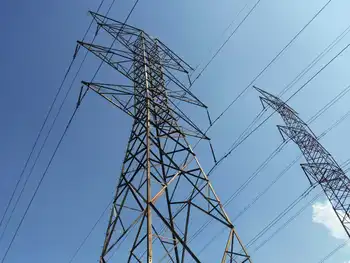Analysis: Europe's Nuclear Games
Gateway To North America's Electrical Industry -
WASHINGTON -- Tony Blair gave Europe's battered nuclear power industry its best news in years this week when his New Labor Party manifesto for the June 7 election said nuclear power stations could "play a part" in securing energy diversity. And some of the credit should go to a former U. S. ambassador.
The very diffidence of Blair's words, and just a single phrase in an otherwise long and detailed document of some 10,000 words, points to the public relations problem that nuclear power has posed for European governments that still depend upon it ever since the 1986 Chernobyl disaster.
Nuclear power stations provide just over 40 percent of Europe's electricity. In France, they provide almost 80 percent. In Sweden, nuclear energy provides just under half of the country's electricity; in Germany, just under one-third.
And yet Sweden and Germany are among a range of European countries now committed, at least by political promises, to phase out nuclear power stations completely over the next two decades.
Some have already begun. Austria declared itself a wholly non-nuclear country in a referendum in 1978, and a non-nuclear clause was added to the constitution in 1999. Italy began dismantling its four nuclear reactors in 1990. Belgium, Spain, the Netherlands and Sweden are now also pledged to gradual phaseouts of their nuclear energy programs.
In part, this reflects the political power of the Green parties, now partners in coalition governments in France, Germany and Sweden. And the Green parties in turn depend for some of the vote and much of their support on the shock that ran through Europe in March and April of 1986, when the Chernobyl nuclear accident sent measurable waves of radiation all across Western Europe.
"Chernobyl changed everything", says Daniel Cohn-Bendit, a 1968 radical student leader in France who now sits in the European Parliament as a Green. "It warned the whole of Europe about the real costs of nuclear power, from the hidden costs of dealing with nuclear waste, to the very real costs of the deaths from radiation poisoning and the slower deaths from radiation-induced cancer. If Three Mile Island was the warning for Americans, Chernobyl was the real thing for Europe."
In this context of broad public suspicion and hostility to nuclear power, the British prime minister's manifesto commitment to maintaining a role for nuclear power in Britain becomes the more significant. Moreover, Britain is becoming a leader in Europe's nuclear industry, at a time when other European countries, just as technologically advanced, are deliberately avoiding an industry that may still have an important future.
Britain, for example, invested heavily in its reprocessing industry. The British Energy corporation, with eight plants in Britain, began buying nuclear plants in the United States in 1999 and plans to acquire 20, and also to lease and operate two Canadian plants. British Nuclear Fuels Corp., a leading reprocessor, has become the lead investor in the promising new "safe" nuclear technology called the Pebble Bed Modular Reactor originally developed by South Africa's Eskom.
Beyond commercial factors, an intellectual reassessment began in Britain in March 1999 when the influential monthly "Prospect" published a long cover article entitled "Nuclear Green," by the U.S. ambassador to the International Atomic Energy Agency, John Ritch. His argument, that nuclear power represented the most sensible solution to the problem of global warming, and that coal mining took each week more lives than nuclear power had claimed in the past 50 years, had a powerful political effect.
"The nuclear age has produced one serious accident but air pollution from fossil fuels kills millions each year," Ritch noted. "The challenge of climate protection arises because it is fossil fuel consumption, not nuclear power, which presents an insoluble waste problem."
Perhaps the most potent argument Ritch made, which inspired a series of British government task forces and policy papers and some serious rethinking (although few conversions) among environmentalists was that "the choice is between the reckless dispersal of horrendous volumes of fossil fuel emissions and the careful containment of comparatively limited quantities of spent nuclear fuel."
"If Europe today were to eliminate nuclear-generated electricity and revert to traditional fossil fuel power, the extra greenhouse gases created would be the equivalent of doubling the number of cars on the road."
Now based in Europe as the head of the World Nuclear Corp., Ritch should take some credit for the modest recognition that the New Labor party manifesto now gives to nuclear power. Britain and France are now likely to remain committed to nuclear power, and to its future development, and so are some Eastern European countries like the Czech Republic and Slovakia, which depend upon existing plants.
But the political power of the Greens means that other key European countries are likely to stick to their pledges to dismantle their existing power plants, even though this accelerates the nuclear waste disposal problem. Europe is all at sea over nuclear power, which at least means that President George W. Bush's new nuclear-friendly energy policy will find no hostile common front across the Atlantic. Indeed, having suffered intense criticism from some European leaders for his rejection of the Kyoto protocol on curbing global warming, Bush can now cite John Ritch and Tony Blair and claim to have become a part of the solution to global warming, while the anti-nuclear Europeans are still part of the problem.
Related News

The gloves are off - Alberta suspends electricity purchase talks with B.C.
EDMONTON - Alberta Premier Rachel Notley says her government is suspending talks with British Columbia on the purchase of electricity from the western province.
It’s the first step in Alberta’s fight against the B.C. government’s proposal to obstruct the Kinder Morgan oil pipeline expansion project by banning increased shipments of diluted bitumen to the province’s coast.
Up to $500 million annually for B.C.’s coffers hangs in the balance, Notley said.
“We’re prepared to do what it takes to get this pipeline built — whatever it takes,” she told a news conference Thursday after speaking with Prime Minister Justin Trudeau on the phone.
Notley said…




